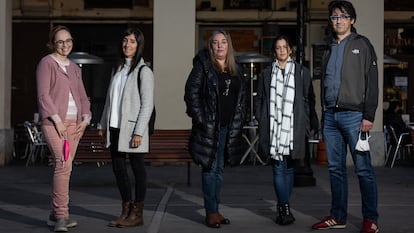For patients without full vaccination, a Covid pass (and a normal life) are out of reach
People who suffered severe adverse reactions to the first dose, and were told by doctors not to get a second shot, now find themselves unable to travel, attend events or enter many venues

Ana María Jiménez, a 29-year-old nursing assistant from Spain with no underlying health conditions, received the first dose of the Pfizer-BioNTech vaccine on July 27. Three days later she woke up “with the left side of my face completely paralyzed.” Scared, she rushed to the emergency room at Barcelona’s Clínic Hospital. The diagnosis was Bell’s palsy, a temporary condition affecting the nerve that controls the facial muscles.
Frederic Sans, a 49-year-old industrial engineer, experienced swelling and redness in the face, arms and legs two weeks after being immunized with the same Covid-19 vaccine. It took three months and a lot of medication – including corticosteroids and antihistamines – to get back to normal.
Laura Joanpera, 40, got vaccinated with Moderna even though she had a history of allergies and sensitivity to certain chemicals. But she certainly did not expect that she would end up having trouble walking or moving her arms.
These three testimonies from people who experienced rare side effects are included in a report by Spain’s Health Ministry, which noted that to December 12, the 72.4 million administered doses have caused 53,407 adverse events, representing 0.07% of the total.
For the vast majority of people, the side effects of vaccination are mild and short-lived, and typically involve pain in the arm where they got the shot, nausea or fever for a day or so. But for a small number of individuals, the effects after the first dose are so serious that doctors are likely to advise against getting a second one.
And this, in turn, is adding a new layer of difficulty to these patients’ problems. Because they lack a Covid certificate proving complete immunization, they are being turned away from all kinds of events and venues requiring proof of immunity from the virus.
“It prevents us from traveling, from accessing any place that requests it and from leading a normal life,” says Joanpera. “When you get an allergic reaction, you can’t stop asking yourself why it had to happen to you, and whether it was all somehow avoidable. But to then get excluded from the [Covid] passport, it makes you feel discriminated against,” adds Sans.
Sara Benjelali, a 49-year-old lawyer, was kicked out of a bar even though she showed the waiters the medical exemption from her cardiologist explaining she could not get a second dose due to tachycardia after the first shot of the Moderna vaccine. “They told me they could not assess that document. That if the QR code did not show up green, would I please leave the premises. It was shocking and painful,” she recalls.
There are no reliable estimates of how many people in Spain now find themselves in this situation after suffering a serious reaction to the first dose of a Covid-19 vaccine. Experts consulted by this newspaper talk about a very low incidence that does not alter the risk-benefit ratio of a campaign that has saved 90,000 lives in the country, according to a recent report by Eurosurveillance, an open-access public health platform.
Useless medical certificates
Most of the people who suffered adverse reactions to a Covid-19 vaccine have a medical certificate explaining why they are exempted from further doses. But this leaves decisions in the hands of venue or event employees who typically do not know what to do.
“This is an administrative problem and the solution is not difficult: just let us get the certificate if the doctor has advised against complete vaccination,” says Joanpera. “It’s not that we don’t want to get vaccinated, on the contrary, it’s just that we can’t, following doctors’ orders.”
But Spain’s regional governments, which are in charge of their own vaccination campaigns, seem to feel that it is not that easy. Authorities in Andalusia and Castilla y León say they are “following European Union guidelines.” Other officials in Catalonia, Galicia and Asturias point out that these individuals can always take a PCR or antigen test, which is another way to obtain the Covid pass (a third is proving recovery from a recent infection). Affected individuals feel frustrated by this reply, and note that they can’t be taking and paying for a PCR test every three days or an antigen test every two.
Murcia and the Basque Country say that certificates showing one dose should be enough to access venues and events. Authorities in the Valencia region hold a similar position. Other regions say they are not aware of any cases of partly vaccinated people getting turned away, while certain regions have not adopted the Covid pass at all. According to the Spanish Health Ministry, it is up to regional governments that have introduced the Covid pass “to establish the relevant exceptions.” But none have done this on paper so far.
Bureaucracy and programming
Inmaculada Roldán, of the Spanish Cardiology Society, points at red tape as one of the sources of the problem, as well as computer programming issues with the way the Covid digital pass was designed in the first place.
“If there is a medical exemption, it should be possible to complete the vaccination certificate anyway,” she explains, adding that this is not the case with people in special situations. “What’s failing is the computer programming aspect at the last step of the certificate, the one that affects citizens the most. It’s a similar story with people who have lived abroad and received other vaccines such as Sinovac and Sputnik. They are allowed to officially validate their situation at international vaccination centers, but translating all that into a digital certificate does not work properly and the resulting QR code is not valid. It is an administrative problem that can become quite relevant for these people.”
Nelly Fernández, a 39-year-old lawyer from Reus in Catalonia, has a long medical history that includes severe endometriosis (a painful condition of the uterus), trigeminal neuralgia (which causes intense facial pain), osteoporosis and fibromyalgia, among other ailments that have been officially recognized as a disability by the public healthcare system. “I did not receive any doses. The doctors told me not to get vaccinated because I have also had a hyper-allergy syndrome that once sent me into anaphylaxis and cardiac arrest,” she says. “All this seems very discriminatory to me, because it forces you to go around explaining your medical history, as if it wasn’t enough to carry on every day with your suffering.”
Tu suscripción se está usando en otro dispositivo
¿Quieres añadir otro usuario a tu suscripción?
Si continúas leyendo en este dispositivo, no se podrá leer en el otro.
FlechaTu suscripción se está usando en otro dispositivo y solo puedes acceder a EL PAÍS desde un dispositivo a la vez.
Si quieres compartir tu cuenta, cambia tu suscripción a la modalidad Premium, así podrás añadir otro usuario. Cada uno accederá con su propia cuenta de email, lo que os permitirá personalizar vuestra experiencia en EL PAÍS.
¿Tienes una suscripción de empresa? Accede aquí para contratar más cuentas.
En el caso de no saber quién está usando tu cuenta, te recomendamos cambiar tu contraseña aquí.
Si decides continuar compartiendo tu cuenta, este mensaje se mostrará en tu dispositivo y en el de la otra persona que está usando tu cuenta de forma indefinida, afectando a tu experiencia de lectura. Puedes consultar aquí los términos y condiciones de la suscripción digital.









































